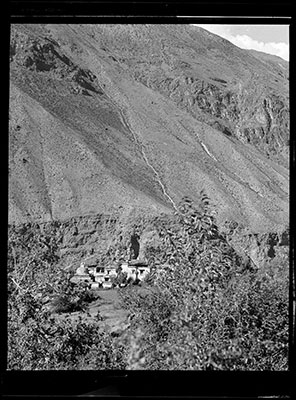
2001.59.4.35.1 (Film negative)


2001.59.4.35.1 (Film negative)

Hugh E. Richardson
Hugh Richardson
1950
Lhodrag Region > Lhakhang Dzong > Khoting
2001.59.4.35.1
54 X 43 mm
Negative film nitrate
Donated August 2001
The executors of the estate of Hugh E. Richardson
Richardson's 1950 Lhodrag tour
Manual Catalogues - Notes on negative album - '4 LHOBRAG 1950' 'Gongkar. Dzaring La. Lha khang Dzong. Sras. Pemaling Tso. Ku la kangri.' is written on the cover of the negative album in white in Richardson's hand. [KC 19/4/2006]
Manual Catalogues - Notes on negative index '4' - Folio 34. 'Do.' [LHAKHANG DZONG]
Manual Catalogues - Richardson's Handlist: 'Album 4. Journey starting at Gong-dkar rdzong on Gtsang-po, 29.18 N. 90. 48 E.[no.] 35. Lho-brag Khom mthing Lha-khang, reputedly a seventh century temple.'
Research publication - Hugh Richardson, High Peaks, Pure Earth , 1998, London, Serindia Publications. Plate 74.
Other information - Background: Lhakhang Dzong is situated on the confluence of the Kuru chu and Tamzhol rivers. The Dzong was an important trading post between Eastern Bhutan and Tsetang, in Central Tibet. In the middle of the settlement is the Khoting Lhakhang (mkho mthing lha khang) founded by Songtsen Gampo during the 7th century. [TS 6/6/2005] Richardson wrote of Khoting temple, "Here [at Lha-khang Dzong] is the ancient but little known temple of Mkho-thing (1950) founded by Srong-brtsan Sgam-po as one of his twelve (some say 108) temples to bind down the limbs of a female demon manacing his kingdom and to give spritual protection to his borders. Half hidden by a buckthorn hedge, it is a little, self-effacing, white-walled building with a roof of wooden shingles and a small, a flat, slate-covered rgya-phibs topped by an insignificant gilded finial." High Peaks, Pure Earth, 1998, London, Serindia Publications. p.321. [KC 21/10/2006]
For Citation use:
The Tibet Album.
"Khoting temple at Lhakhang Dzong in Lhodrag "
05 Dec. 2006. The Pitt Rivers Museum.
<http://tibet.prm.ox.ac.uk/photo_2001.59.4.35.1.html>.
For more information about photographic usage or to order prints, please visit the The Pitt Rivers Museum.
© The Pitt Rivers Museum